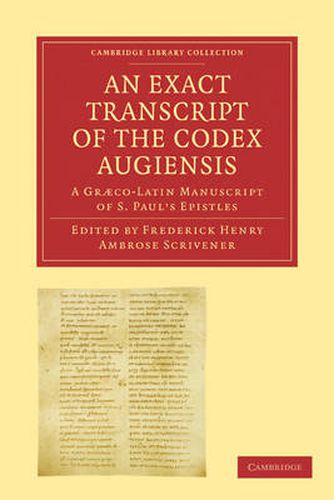Readings Newsletter
Become a Readings Member to make your shopping experience even easier.
Sign in or sign up for free!
You’re not far away from qualifying for FREE standard shipping within Australia
You’ve qualified for FREE standard shipping within Australia
The cart is loading…






Frederick Henry Scrivener (1813-1891) was a pioneer of New Testament textual criticism. His transcription of the Codex Augiensis - a ninth-century Greek and Latin manuscript of St Paul’s Epistles which had been part of the famous Benedictine library at Reichenau - was published in 1859 and is a document of considerable historical significance in biblical research. It presents ‘as true an image as possible’ of the ninth-century text. The volume also includes a ‘full and exact’ collation of fifty manuscripts of the Gospels. In his Critical Introduction, Scrivener provides a detailed account of the manuscripts he has collated, setting the context for the reader. He also investigates the principles of comparative criticism, demonstrating that true and faithful readings of the Greek New Testament cannot be derived from any one authority, but must be the result of patient comparison of the evidence provided by all.
$9.00 standard shipping within Australia
FREE standard shipping within Australia for orders over $100.00
Express & International shipping calculated at checkout
Stock availability can be subject to change without notice. We recommend calling the shop or contacting our online team to check availability of low stock items. Please see our Shopping Online page for more details.
Frederick Henry Scrivener (1813-1891) was a pioneer of New Testament textual criticism. His transcription of the Codex Augiensis - a ninth-century Greek and Latin manuscript of St Paul’s Epistles which had been part of the famous Benedictine library at Reichenau - was published in 1859 and is a document of considerable historical significance in biblical research. It presents ‘as true an image as possible’ of the ninth-century text. The volume also includes a ‘full and exact’ collation of fifty manuscripts of the Gospels. In his Critical Introduction, Scrivener provides a detailed account of the manuscripts he has collated, setting the context for the reader. He also investigates the principles of comparative criticism, demonstrating that true and faithful readings of the Greek New Testament cannot be derived from any one authority, but must be the result of patient comparison of the evidence provided by all.